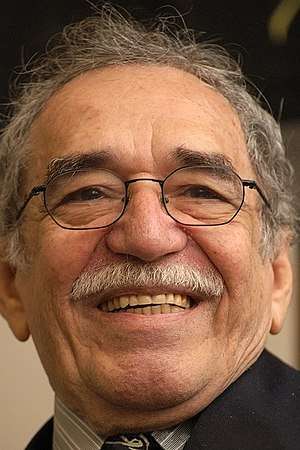Gabriel García Márquez

Gabriel García Márquez. The name that is synonymous with Magic Realism. Born in Colombia, the man was on the writing scene for a very long time and produced a solid body of work. In 1982, he gained the Nobel Prize in literature. His book One Hundred Years of Solitude has become the definitive work of Magic Realism and is required reading in schools, not to mention his most famous book.
His books deal with themes like solitude, eternal cycles, Banana Republics, political disputes and civil wars, themes present in his life and the life of his country with distressful frequence.
He also immersed himself into the cinema, helping directors to turn some of his books into films. He was a journalist by trade during The Forties and
Nowadays, García Márquez's fame has become a little awkward to Latin American writers, since it has generated the impression that all the literature of the zone is about angels, jungles and countryside. As a countermovement, the McOndo literary movement has been created by writers trying to present a more actualized Latin America. He’s still respected by those writers as a good writer, however.
He left writing as he was diagnosed of dementia on 2012, and died on 2014 at 87.
- Leaf Storm (1955)
- No One Writes to the Colonel (1961)
- In Evil Hour (1962)
- Big Mama's Funeral (1962, collection of short stories)
- One Hundred Years of Solitude (1967)
- The Incredible and Sad Tale of Innocent Eréndira and Her Heartless Grandmother (1972)
- The Autumn of the Patriarch (1975)
- Chronicle of a Death Foretold (1981)
- Love in the Time of Cholera (1985)
- The General in His Labyrinth (1989)
- Strange Pilgrims (1993, collection of short stories)
- Of Love and Other Demons (1995)
- Living to Tell the Tale (2002), his autobiography
- Memories of My Melancholy Whores (2004), his last fiction book
- Anachronic Order: The norm on his novels.
- Banana Republic: The setting of almost all his books.
- Battle Butler: José Palacios in The General in his Labyrinth.
- Civil War
- Double Standard: Usually lampshaded.
- Eternal Recurrence: A central theme in a lot of stories is the fact that some things are bound to repeat themselves over and over again.
- The Generalissimo: An important character is most of his books. Actually, in some of them (The Autumn of the Patriarch, The General in his Labyrinth) he's the main character.
- Generation Xerox: comes with the recurrence theme.
- Historical Domain Character: Most of the main characters in The General in his Labyrinth, especially Simón Bolívar.
- Historical Fiction Literature: Many of his books make implicit or explicit allusions to "La Violencia", a period of civil conflict in Colombia. Similarly, some of the books refer to the Thousand Days War (like One Hundred Years of Solitude or Memories of My Melancholy Whores). The General in his Labyrinth deals with the last days of Bolívar.
- Honor Before Reason
- Honor-Related Abuse
- Lonely at the Top
- Magic Realism: One of the Trope Makers, definitely Trope Codifier.
- Mind Screw
- Roman à Clef: Several of his novels and short stories were inspired by (and often incorporated) several real-life events with just some name changes. García Márquez used to be a journalist by trade, so often he got inspiration while investigating for chronicles.
- Small Reference Pools: When people are asked to name a Latin American writer, García Márquez is one of the few names that come up.
- Turn Out Like His Father: another common theme of his works.